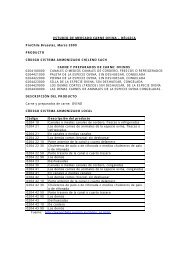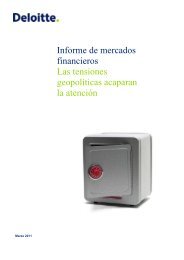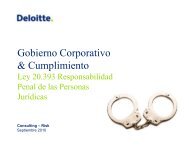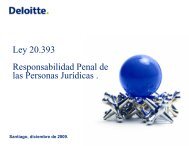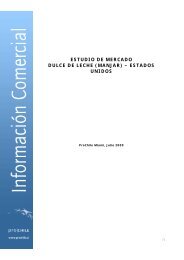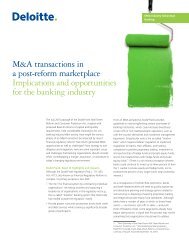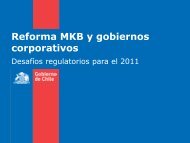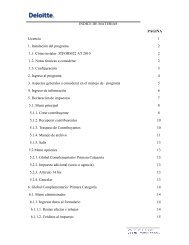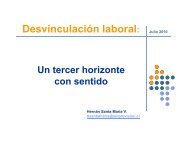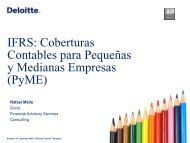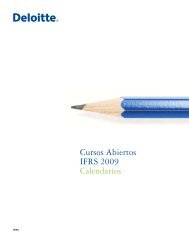Tax Advisers - Deloitte
Tax Advisers - Deloitte
Tax Advisers - Deloitte
You also want an ePaper? Increase the reach of your titles
YUMPU automatically turns print PDFs into web optimized ePapers that Google loves.
Canada<br />
2006 – a year of significant<br />
developments<br />
Leslie Morgan<br />
Blake, Cassels & Graydon<br />
Toronto<br />
The past year has seen important proposed legislation as well<br />
as a number of judicial decisions. The most important<br />
legislative proposals have been directed at the proliferation<br />
of income trusts and flow-through partnerships as business<br />
entities in Canada. The initial legislative proposal was to<br />
reduce personal taxes on eligible dividends paid after 2005,<br />
so as to provide taxable holders of public company shares<br />
with the same after-tax return as holders of income trust<br />
units. This would essentially eliminate double taxation on<br />
corporate profits distributed to such shareholders.<br />
Despite this proposal, many large public companies<br />
announced plans to convert to income trusts and on October<br />
31 2006 much bigger changes were announced. These new<br />
proposals create a regime for publicly traded trusts and their<br />
investors which is similar, but not identical, to that for public corporations and their<br />
shareholders. The new rules apply to publicly traded Canadian trusts (other than<br />
certain narrowly defined real estate investment trusts and those that hold only<br />
portfolio investments). Under the proposals, the trust will be subject to a special tax on<br />
distributions of income attributable to non-portfolio investments, at a rate that will<br />
approximate the corporate tax rate. Investors will also be taxable on the distributions<br />
as if they were dividends from a taxable Canadian corporation. The new rules will<br />
apply to existing trusts publicly traded before November 2006 for taxation years that<br />
end after 2010 and to entities that became publicly traded after October 2006 for the<br />
later of their 2007 taxation year and the taxation year in which they began to be traded.<br />
Similar rules are proposed for publicly-traded partnerships. The proposals state that<br />
the hiatus in application may be revisited if there is “undue expansion”, as clarified in<br />
a subsequent release, of an existing entity. In addition, the proposals contained an<br />
unusually specific anti-avoidance statement to the effect that new structures designed<br />
to frustrate the policy of the proposals may result in immediately effective changes.<br />
Revised draft legislation dealing with Canada’s foreign affiliate rules, the foreign<br />
investment entity rules (FIE rules) and the non-resident trust rules was released once<br />
again in November of 2006. In light of the long implementation delay, the date of<br />
application of the FIE rules and the non-resident trust rules has been moved back from<br />
taxation years beginning after 2002 to taxation years beginning after 2006. The<br />
proposed rollover for a Canadian resident shareholder who exchanges shares of a<br />
Canadian corporation for shares of a foreign corporation first raised in 2000 has been<br />
postponed again. Until the new rule is introduced, complex exchangeable share<br />
structures will continue to be utilized in these circumstances.<br />
The 2006 Federal Budget noted an intention to release a discussion draft of legislative<br />
proposals that would permit certain corporations to report income in a currency other<br />
than Canadian dollars where their business activities are conducted primarily in that<br />
currency. Neither the expected date for release of these proposals nor their effective<br />
date has been set.<br />
In 2004, the Canada Revenue Agency stated that its policy was to challenge treatyshopping<br />
arrangements. In 2005, the Canadian general anti-avoidance rule (the<br />
GAAR) was amended retroactive to 1988 to clarify that the GAAR could apply to deny<br />
treaty benefits. The decision in MIL (Investments) is the first Canadian tax case to<br />
consider the legislative amendment to the GAAR in the context of a continuance to<br />
Luxembourg shortly before a disposition of shares. At the <strong>Tax</strong> Court of Canada, the<br />
taxpayer succeeded on the basis that in the circumstances the taxpayer’s reliance on the<br />
provisions of the Luxembourg Treaty was not abusive tax avoidance. The Crown has<br />
appealed the decision to the Federal Court of Appeal.<br />
34 Guide to the World’s Leading <strong>Tax</strong> <strong>Advisers</strong>




